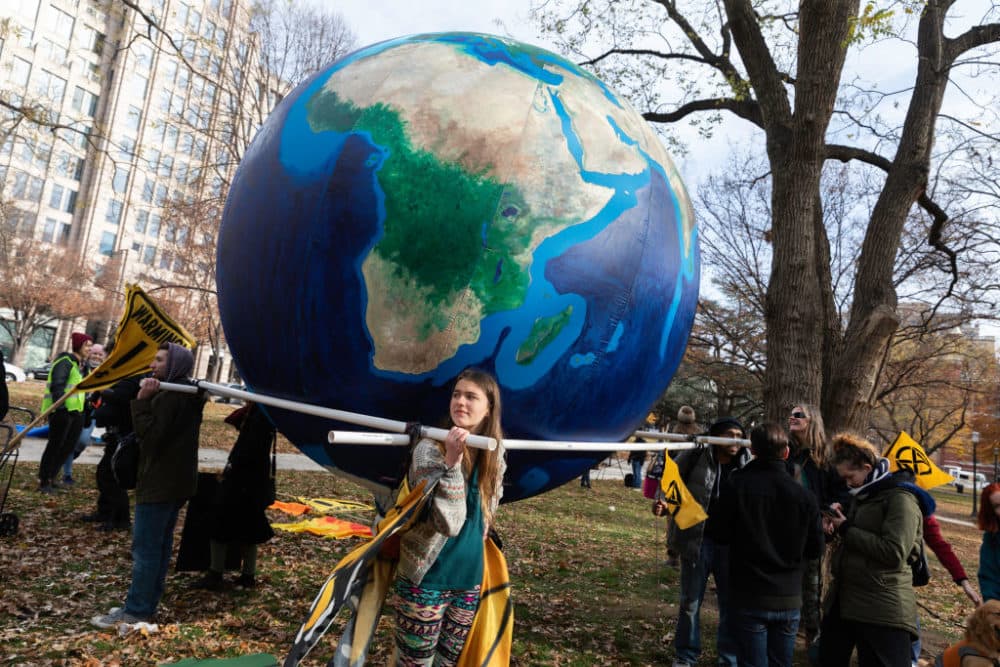Advertisement
Commentary
The world is burning. Our politics are broken. And we still need to vote

I can’t hold back. I’m going to do it. In light of predictions of low voter turnout among people under the age of 35 in the midterms, I’m writing the litany of “when I was your age” outrages that I’ve until now hesitated to invoke.
Ready? Here goes. When I was under 35, not only were thousands of women dying from illegal abortions every year, but in some states and countries, women could not get contraception or credit cards without their husbands’ consent. Newspapers ran separate job listings for men and for women; women earned 59 cents for every dollar men earned doing the same work; homosexuality was stigmatized and criminalized; Christian prayer was mandatory in the school I attended; segregation was legal in the South; and manufacturers dumped pollutants into rivers and oceans free of limits or consequences.
To be fair, we’ve seen massive changes for the better (as well as for the worse) in the past 75 years. And while mass movements generated the demand for change, it was laws enacted by elected legislators and the judges they appointed that cemented it. Simply put, voting mattered then and it still does.
So why have I been reluctant to offer this scolding list when my progressive, admirable young neighbor tells me that they have no faith in electoral politics? It’s because when they also tell me — like 56% of 18-29 year-olds in a recent national poll -- they believe that “politics are no longer able to meet the challenges our country is facing,” I have to concur.
In building a new society, young voters cannot afford to entirely turn their backs on the existing one.
They see a largely white gerontocracy running all three branches of government, prolonged and fatal inaction on climate change, opportunistic support for repressive regimes around the world, more handwringing than action around the mounting refugee crisis and an escalating, astounding income gap in which, according to Bill McKibben in his book, “Falter,” “the world’s eight richest men possess more wealth than the bottom half of humanity." This trend is particularly pronounced in the United States, where the three richest men have more wealth than the bottom 150 million people taken together.”
No wonder that this person, like 42% of their generational cohort, feels that their vote “doesn’t make a difference,” and, like 36% of people in this demographic, that “political involvement rarely has tangible results.”
Fortunately, my neighbor and so many of their peers are not using cynicism as a justification for inaction. On the contrary, they are energetically pursuing social justice through non-electoral means, committing unpaid time to building dwellings for the poor and homeless, learning and practicing sustainable agriculture, curtailing their consumption to prevent debt and unsustainable manufacturing practices and supporting small, local businesses despite the higher costs of doing so.
Advertisement
As I learned in a tasty, informative, locally sourced dinner together, many of them are enacting the ideology of Solarpunk. “The ‘punk’ in Solarpunk is about rebellion, counterculture, post-capitalism, decolonialism and enthusiasm,” explains the movement’s manifesto. “It is about going in a different direction than the mainstream, which is increasingly going in a scary direction.” Solarpunk demands solutions, not just warnings: “a vision of a future that embodies the best of what humanity can achieve: a post-scarcity, post-hierarchy, post-capitalistic world where humanity sees itself as part of nature and clean energy replaces fossil fuels.” Dystopian prognostications have no place in this world view.
If a vision of a “post-scarcity” and “post-capitalistic” world isn’t utopian, I don’t know what is. But ironically, that celebratory confidence is also a problem. Because we’re nowhere near that end goal.
Hope needs to be leavened with fear — fear not just of the climate catastrophe that is already unfolding, but of the grotesquely regressive cultural changes that a fanatical Republican minority seeks to impose. That’s why young people, even those who don’t believe electoral politics can be a positive force for change, need to vote -- because there are significant, life-changing differences between parties.
Yes, it’s true that except for a handful of politicians, even the self-proclaimed “progressives” receive money from corporate donors; they evade and obfuscate. There’s no denying that 76% of the self-interested high tech industry’s political contributions go to Democrats. But it’s also true that 68% of political money from the energy industry goes to Republicans, as does 72% of the dollars from agribusiness. These generally malign sectors know who has served their interests in the past and who is more likely to do so in the future. And on issues of equity, human rights, taxes, Supreme Court judges and healthcare, not even the most dogged cynic can deny that the Republican party has consistently voted against their interests, while the Democrats have more generally voted to at least protect what gains have been made.
I agree with my young friends: capitalism sucks and our electoral system has become obscenely unrepresentative. I think that voting is necessary but not sufficient, and I applaud their urgency and quest for radical solutions. But even if Congress and the White House can no longer be the primary driver of positive, durable change, who serves in these offices makes the difference between maintaining what mass movements have won, or seeing them rolled back in a tide of aggrieved reaction.
In building a new society, young voters cannot afford to entirely turn their backs on the existing one. What I hope for them — for all of us — is that they feel both determined and constructively afraid, using both fear and optimism as spurs to both defensive actions and transformative ones.
